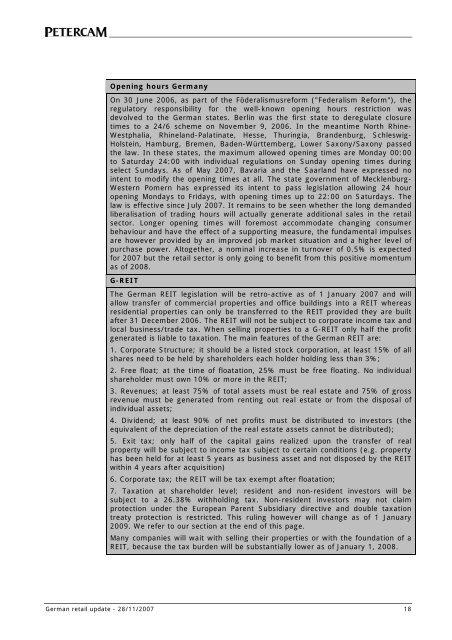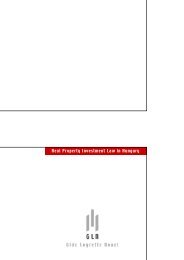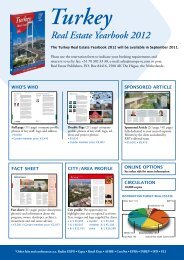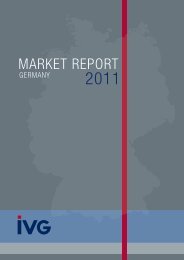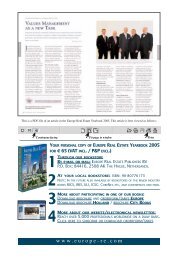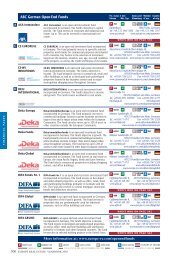DIRECT MARKET REPORT GERMAN RETAIL - Europe Real Estate
DIRECT MARKET REPORT GERMAN RETAIL - Europe Real Estate
DIRECT MARKET REPORT GERMAN RETAIL - Europe Real Estate
Create successful ePaper yourself
Turn your PDF publications into a flip-book with our unique Google optimized e-Paper software.
Opening hours Germany<br />
On 30 June 2006, as part of the Föderalismusreform ("Federalism Reform"), the<br />
regulatory responsibility for the well-known opening hours restriction was<br />
devolved to the German states. Berlin was the first state to deregulate closure<br />
times to a 24/6 scheme on November 9, 2006. In the meantime North Rhine-<br />
Westphalia, Rhineland-Palatinate, Hesse, Thuringia, Brandenburg, Schleswig-<br />
Holstein, Hamburg, Bremen, Baden-Württemberg, Lower Saxony/Saxony passed<br />
the law. In these states, the maximum allowed opening times are Monday 00:00<br />
to Saturday 24:00 with individual regulations on Sunday opening times during<br />
select Sundays. As of May 2007, Bavaria and the Saarland have expressed no<br />
intent to modify the opening times at all. The state government of Mecklenburg-<br />
Western Pomern has expressed its intent to pass legislation allowing 24 hour<br />
opening Mondays to Fridays, with opening times up to 22:00 on Saturdays. The<br />
law is effective since July 2007. It remains to be seen whether the long demanded<br />
liberalisation of trading hours will actually generate additional sales in the retail<br />
sector. Longer opening times will foremost accommodate changing consumer<br />
behaviour and have the effect of a supporting measure, the fundamental impulses<br />
are however provided by an improved job market situation and a higher level of<br />
purchase power. Altogether, a nominal increase in turnover of 0.5% is expected<br />
for 2007 but the retail sector is only going to benefit from this positive momentum<br />
as of 2008.<br />
G-REIT<br />
The German REIT legislation will be retro-active as of 1 January 2007 and will<br />
allow transfer of commercial properties and office buildings into a REIT whereas<br />
residential properties can only be transferred to the REIT provided they are built<br />
after 31 December 2006. The REIT will not be subject to corporate income tax and<br />
local business/trade tax. When selling properties to a G-REIT only half the profit<br />
generated is liable to taxation. The main features of the German REIT are:<br />
1. Corporate Structure; it should be a listed stock corporation, at least 15% of all<br />
shares need to be held by shareholders each holder holding less than 3%;<br />
2. Free float; at the time of floatation, 25% must be free floating. No individual<br />
shareholder must own 10% or more in the REIT;<br />
3. Revenues; at least 75% of total assets must be real estate and 75% of gross<br />
revenue must be generated from renting out real estate or from the disposal of<br />
individual assets;<br />
4. Dividend; at least 90% of net profits must be distributed to investors (the<br />
equivalent of the depreciation of the real estate assets cannot be distributed);<br />
5. Exit tax; only half of the capital gains realized upon the transfer of real<br />
property will be subject to income tax subject to certain conditions (e.g. property<br />
has been held for at least 5 years as business asset and not disposed by the REIT<br />
within 4 years after acquisition)<br />
6. Corporate tax; the REIT will be tax exempt after floatation;<br />
7. Taxation at shareholder level; resident and non-resident investors will be<br />
subject to a 26.38% withholding tax. Non-resident investors may not claim<br />
protection under the <strong>Europe</strong>an Parent Subsidiary directive and double taxation<br />
treaty protection is restricted. This ruling however will change as of 1 January<br />
2009. We refer to our section at the end of this page.<br />
Many companies will wait with selling their properties or with the foundation of a<br />
REIT, because the tax burden will be substantially lower as of January 1, 2008.<br />
German retail update - 28/11/2007 18


